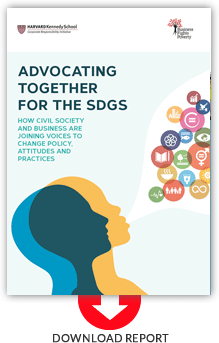In a world where at least half of the world’s population cannot obtain essential health services, achieving Universal Health Coverage (UHC) – the idea that everybody in the world should be able to access the healthcare they need without fear of financial hardship – has become a critical building block for Save the Children and GSK’s partnership. Our partnership, established in 2013 to help save one million children’s lives, supports the Sustainable Development Goal (SDG) targets of a world in which no child under five dies from preventable causes and that UHC is achieved with no-one left behind.
An important component of our partnership is using our voices collectively and separately to advocate for systemic change for children’s health and to inspire others to act. And with opinion divided on the role of the private sector in achieving UHC, our work also aims to encourage an open dialogue on how businesses can most appropriately and effectively play their part.
From the early days of the partnership, joint advocacy has played a valuable role in strengthening alignment between our organisations. Working together on policy issues like UHC has enabled us to deepen our understanding of each other’s positions and policy ambitions, which has extended into wider related policy issues like the pricing of medicines and tax transparency.
With input and advice from Save the Children, in early 2014, GSK established its own policy position in support of UHC, clarifying its role as a private sector organisation and ensurin g its own policies and practices are consistent with the goals of UHC. Within this, GSK developed a set of principles for governments and businesses to consider when designing UHC policies. GSK’s policy position on UHC has also helped to inform the development of a global pharmaceutical sector industry position in support of UHC, which was adopted in April 2014.
g its own policies and practices are consistent with the goals of UHC. Within this, GSK developed a set of principles for governments and businesses to consider when designing UHC policies. GSK’s policy position on UHC has also helped to inform the development of a global pharmaceutical sector industry position in support of UHC, which was adopted in April 2014.
Our different voices reach different audiences. We have been able to leverage each other’s networks and convening power to widen our engagement with stakeholders with whom we might not traditionally engage. For example, Save the Children has been able to facilitate GSK’s engagement with the UHC2030 partnership and GSK has enabled Save the Children to engage constructively with the global pharmaceutical sector, for example when co-convening a meeting on access to medicines during the WHO Executive Board in 2017.
At the global policy level, joint advocacy in the lead up to the SDG Summit in 2015 made the case for the UHC and child mortality targets to be included, and since then we have worked to keep UHC on the global agenda with a focus on the role of the private sector, through convening meetings in fora such as the World Health Assembly and the UHC Forum.
At the country level, both GSK and Save the Children have helped to mobilise grassroots campaigns for free access to healthcare for children and pregnant women. In Burkina Faso, we supported the Ma Voix campaign that, during the national elections in 2015, called for the removal of user fees for children under-five and pregnant women. In April 2016, the newly elected government in Burkina Faso ended user fees for pregnant women and children under five, to be paid for by a new tax.
Beyond UHC, both organisations advocate together on a range of other issues including advocacy to increase access to medicines and vaccines and to promote responsible business practices.
Of course, joint advocacy does not come without its challenges. We take particular care to anticipate and address any perceived conflicts between GSK’s commercial interests and the activities of the partnership. Commercial interests are not the only potential conflicts and the partnership seeks to apply the same scrutiny across all activity.
There are also issues that we do not completely agree on, for example the role of private health insurance in UHC, but our relationship is mature enough to acknowledge and accept these differences and to seek to close gaps in understanding through open and honest dialogue.
We believe UHC can be achieved in a way which meets the goals of communities, governments and industry and expands access to medicines and services whilst preserving incentives for future innovation and sustainability. Having a shared vision on UHC, maintaining dialogue and combining our voice and influence to engage policy makers has enabled us to make progress towards our shared goals, despite, or sometimes because of, our differences.










